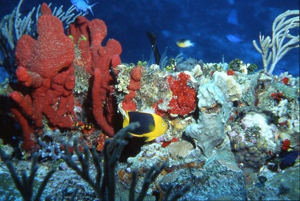University Course Schedules
Examples of Course Options for First-Year marine science graduate students at UT-Austin
| BIO | 320 | CELL BIOLOGY | FALL | |||||||
| BIO | 326R | GENERAL MICROBIOLOGY:MICROBIAL CELL STRUCTURE & GENETICS | FALL | |||||||
| BIO | 344 | MOLECULAR BIOLOGY | SPRING | |||||||
| BIO | 370 | EVOLUTION | SPRING | |||||||
| BIO | 380R | ADVANCED READINGS IN BIOLOGICAL SCIENCE | FALL | |||||||
| BIO | 383K | 7-SMNR IN PHYSIOL AND BEHAVIOR | SPRING | |||||||
| BIO | 383K | 7-SMNR IN PHYSIOL AND BEHAVIOR | FALL | |||||||
| BIO | 383K | STUDIES IN ANIMAL SEXUALITY | SPRING | |||||||
| BIO | 384C | INTRO TO ECOL/EVOL/BEHAVIOR I | FALL | |||||||
| BIO | 384D | INTRO TO ECOL/EVOL/BEHAVIOR II | SPRING | |||||||
| BIO | 384K | RECENT ADVANCES IN ECOSYSTEM ECOLOGY (offered on-line) | FALL | |||||||
| BIO | 384K | ADVANCED TOPICS IN MICROBIAL ECOLOGY | FALL | |||||||
| BIO | 384K | CONSERVATION BIOLOGY | SPRING | |||||||
| BIO | 384K | LANDSCAPE ECOLOGY | FALL | |||||||
| BIO | 384K | PHYLOGEN PERSP ECOL/EVOL/BEHAV | FALL | |||||||
| BIO | 384L | ISSUES IN POPULATION BIOLOGY | FALL | |||||||
| BIO | 386 | TOPICS IN CONSERVATION BIOLOGY | FALL | |||||||
| BIO | 388M | PLANT MOLECULAR BIOLOGY | FALL | |||||||
| BIO | 390C | FUNDAMENTALS OF EVOLUTION | FALL | |||||||
| BIO | 390D | FNDMNTLS INTG ANIMAL BEHAV | FALL | |||||||
| BIO | 393 | BIOFUELS | SPRING | |||||||
| BIO | 395M | ADVANCED MICROBIOLOGY | SPRING | |||||||
| C E | 394K | 3-GEOG INFO SYS IN WATER RES | FALL | |||||||
| CH | 369 | FUNDAMENTALS OF BIOCHEMISTRY | SPRING | |||||||
| CH | 391L | BIOINFORMATICS | SPRING | |||||||
| CRP | 383 | ENVIRONMENTAL POLICY AND LAW | SPRING | |||||||
| EER | 396 | ENERGY LAW | FALL | |||||||
| GEO | 381G | GEOMICROBIOLOGY | FALL | |||||||
| GEO | 382S | PHYSICAL HYDROLOGY | FALL | |||||||
| GEO | 391 | PALEOCLIMATOLOGY | FALL | |||||||
| GEO | 391 | FUNDAMENTALS/APPLIC OF ICP-MS | FALL | |||||||
| GEO | 388H | ENVIRONMENTAL ISOTOPE GEOCHEM | SPRING | |||||||
| GEO | 388L | ISOTOPE GEOLOGY | FALL | |||||||
| GRG | 396T | SPECIES DISTRIBUTION MODELING | SPRING | |||||||
| MOL | 395J | GENES/GENOMES/GENE EXPRESSN | FALL | |||||||
| M E | 397 | LASERS AND OPTICS | SPRING | |||||||
| PHR | 384K | FUNDAMENTALS OF TOXICOLOGY | FALL | |||||||
| PHR | 390N | BIOCHEM AND MOLEC TOXICOLOGY | SPRING | |||||||
| PSY | 384K | ADV STATS: EXPERIMENTAL DESIGN | SPRING | |||||||
| PSY | 394T | REGRESSION ANALYSIS | FALL | |||||||
| SDS | 380C | STATISTICAL METHODS I | FALL | |||||||
| SDS | 383C | STATISTICAL MODELING I | FALL | |||||||
| SDS | 384 | 4-REGRESSION ANALYSIS | FALL | |||||||
CORE COURSES

MNS 481C. Marine Ecosystem Dynamics (Ken Dunton / Jordan Casey)
Taught Every Fall
Interactions between organisms and the physical processes that regulate productivity and distribution of marine life in oceanic and coastal ecosystems. Four lecture hours a week for one semester. Prerequisite: Graduate standing; and either consent of instructor or the following: six semester hours of coursework in biological sciences chosen from Biology 311C, 311D, and the equivalent; and Chemistry 301 and 302, or the equivalent.
MNS 482C. Marine Biogeochemistry (Zhanfei Liu / Mark Lever)
Taught Every Fall
Study of chemical, biological, geological, and physical processes that influence cycling of bioactive elements in marine waters and sediments. Four lecture hours a week for one semester. Prerequisite: Graduate standing; and either consent of instructor or the following: Physical Science 303 and 304, or the equivalent; Chemistry 301, 302, 310M (or 610A), and 310N (or 610B), or the equivalent; and six semester hours of coursework in biological sciences chosen from Biology 311C, 311D, and the equivalent.
MNS 483C. Adaptations to the Marine Environment (Andrew Esbaugh / TBD)
Taught Every Spring
The physiological basis for organismal and population-level responses to marine environments. Four lecture hours a week for one semester. Prerequisite: Graduate standing; and either consent of instructor or the following: six semester hours of coursework in biological sciences chosen from Biology 311C, 311D, and the equivalent; and Chemistry 301 and 302, or the equivalent.
MNS 191. Seminar in Marine Science: Scientific Communication (TBD)
Taught Every Spring
Held at the Marine Science Institute in Port Aransas
Recent advances in the marine sciences, discussed by students, faculty and staff members, and guest lecturers. Topics to be announced. Must be taken twice to fulfill degree requirements.
ADVANCED COURSES
(All advanced courses are taught on an alternating year schedule)
*The Graduate Studies Committee of the Department of Marine Science will periodically add or delete advanced courses from this list depending upon program needs and faculty workloads. Students are required to enroll in a minimum of six hours of MNS advanced courses and are encouraged to communicate with their thesis advisor in the selection of advanced courses. Course Title and Description are updated the semester prior to their listing for the fall or spring semester.
Fall Semester (Odd Years)
MNS 193. Topics in Marine Science: Marine Environmental Microbiology - Mark Lever
MNS 193. Topics in Marine Science: Marine Populations and Fisheries - TBD
MNS 193. Topics in Marine Science: TBD
Spring Semester (Even Years)
MNS 193. Topics in Marine Science: Marine Trophic Ecology - Jordan Casey
MNS 293. Topics in Marine Science: Marine Organic Geochemistry - Zhanfei Liu
MNS 382. Principles of Marine Science: Estuarine Ecology - Ken Dunton
Fall Semester (Even Years)
MNS 193. Topics in Marine Science: Isotope Ecology - Sharon Herzka
MNS 193. Topics in Marine Science: Aquatic Toxicology and Risk Assessment - Kristin Nielsen
MNS 193. Topics in Marine Science: Coral Reef Ecosystems/Coral Reef Biology - Simon Brandl
Spring Semester (Odd Years)
MNS 193. Topics in Marine Science: Environmental Physiology of Fishes - Andrew Esbaugh
MNS 193. Topic 7. Topics in Marine Science: Marine Botany - Ken Dunton
MNS 382. Marine Community Ecology - Jordan Casey or Simon Brandl
MNS 382. Marine Botany-Mexico - Ken Dunton / Sharon Herzka
SPRING 2025
MNS 193. Trophic Ecology - Jordan Casey
Held at the Marine Science Institute in Port Aransas. Taught face-to-face. Not video-linked. This course focuses on trophic interactions in marine communities. Students will overview seminal publications in trophic ecology and gain expertise in approaches used to track ingestion and nutrient exchange among marine organisms, including behavioral observations, biogeochemical and molecular techniques, and statistical modeling. Students will evaluate and lead discussions on notable, recent publications. As a final project, students will create a grant proposal involving trophic ecology in their research area.
MNS 193. Topic 7. Topics in Marine Science: Marine Botany - Ken Dunton
Held at the Marine Science Institute in Port Aransas – Taught face-to-face. Not video-linked.
Marine Botany will introduce students to the marine vegetation of the major coastal biomes of the world, including but not limited to seagrasses, marshes, mangroves, and seaweeds. The purpose of this class is to provide graduate-level inquiry-based exploration on topics including ecology, diversity, natural history, reproduction, photosynthetic strategies, and biotic responses to a warming climate. Field trips will broaden students' understanding of the ecology of these systems with respect to habitat, biotic interactions, community structure, and biotic linkages to consumers. The course format consists of seven meetings that include a background lecture followed by field trips to specific vegetation assemblages. Each student is expected to lead one discussion based on assigned readings from the primary literature and write a final paper on a selected topic. The course uses a thematic approach and is divided into two major parts: a section that concentrates on plant photophysiology and ecology and a section on vegetation assemblages. Students will gain a wonderful appreciation and understanding of the diversity of marine plants and their unique strategies of growth, photosynthesis, and reproduction from readings, class discussions, guest lectures, and field trips.
MNS 382. Marine Geoecology - Mark Lever
Held at the Marine Science Institute in Port Aransas.
Today's Earth system is the outcome of complex interactions between organisms and their physiochemical surroundings over the past 4 billion years. This course will cover the role of marine life in driving conditions in Earth's geo-, hydro-, and atmosphere through time, thereby integrating fundamental concepts across the fields of geology, chemistry, microbiology, and macroecology. The equivalent of three lecture hours a week for one semester; additional lecture and field/laboratory hours may be required. May be repeated for credit when the topics vary. Prerequisite: Graduate standing.
MNS 382. Marine Community Ecology - Simon Brandl
Taught at the Marine Science Institute. NOT offered over video link. This course aims to provide students with a holistic understanding of the assembly and functioning of marine communities. Students will gain insight into both traditional and newly emerging techniques to study marine communities, from visual censuses to molecular approaches. The course includes practical components using the statistical software R. The equivalent of three lecture hours a week for one semester; additional lecture and field/laboratory hours may be required. May be repeated for credit when the topics vary. Prerequisite: Graduate standing.
SPRING 2025 MAY TERM
MNS 382 Marine Botany-Mexico - Ken Dunton/Sharon Herzka
Hour(s) to be arranged. Designed to accommodate 21 or fewer students. Restricted enrollment; contact the department for permission to register for this class. Exploration of the marine algae, seagrasses, mangroves, and other vascular plants of the southern Gulf of Mexico, emphasizing their taxonomy, physiology, and ecology. Will include field trips to representative coastal habitats. Restricted to students in the May Term Study Abroad Program. Class meets May 6-June 4. Faculty-led Study Abroad Program taught in Celestun, Mexico. Students must consult with the department for information on program and travel fees, concurrent enrollment in NSC 109, and specific dates of international travel. May be repeated for credit when the topics vary. Prerequisite: Graduate standing.
MNS 382. Coastal Biogeochemical Processes - Mark Lever
Held at the Marine Science Institute in Port Aransas.
Hour(s) to be arranged. May be repeated for credit when the topics vary. Prerequisite: Graduate standing. Topic description: Estuarine and coastal environments are among Earth's most productive ecosystems, and play a key role in the global carbon, nitrogen, and sulfur cycles. In this course, we will explore biogeochemical processes across diverse ecosystems of the Texas coast along with the impacts human activities are having on them. Course activities will include field trips, student-led research projects, hands-on training in sedimentological, geochemical, and microbiological techniques, and science communication through paper writing and public presentations. May Term class offered in residence only at the Marine Science Institute in Port Aransas, TX.








